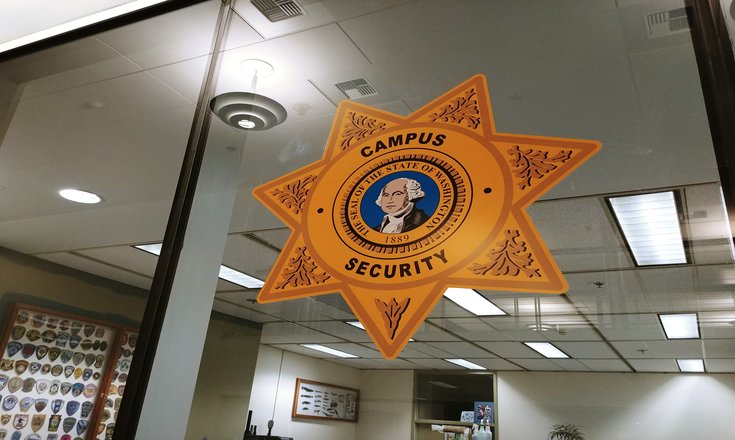Security officers at Seattle Central College provide protection and foster a safe environment for students, staff, and faculty. They are the first to welcome students and faculty headed to their long-awaited in-person classes each morning, and they are also the first ones to answer a call for help whenever and wherever it is needed.
But for years, the department has failed to receive consistent, up-to-date training and certifications.
“We’ve had each other’s backs through all of this, it’s been rough,” said Joel Workinger, who’s been a security officer at Central for more than 20 years.
Last summer, when a homeless encampment occupied Central’s South Plaza, security officers said they felt endangered after they claimed they were asked to patrol and monitor the area without the equipment they typically carry — a baton, a pair of handcuffs, and pepper spray. The tools had been taken away after discrepancies came to light about a years-old Washington Administrative Code (WAC) that had not given security officers the authority to carry batons, in addition to missing training on the use of OC spray (pepper spray) and handcuffs.
The district has revised its policy to authorize officers to carry batons. However, the state administrative code is not updated to provide that authority — still only allowing commissioned police officers and military personnel to be in possession of batons. Just a few months ago, the department received training in the use of batons, OC spray, handcuffs, and de-escalation tactics.
“Hopefully most of these tools we never have to use,” said Workinger, “but they are there if we need them.”
For that, officers credit Darryl Johnson, Central’s new security director who joined the department last summer. “You know, there’s a light at the end of the tunnel,” said Workinger of Johnson’s recent efforts. Johnson referred the Collegian to Roberto Bonaccorso, Central’s Public Information Officer, several times upon requests for an interview.
But two officers — who wished to remain anonymous — told the Collegian that prior to Johnson’s leadership, they had been missing training on the use of batons, OC spray, and handcuffs for years. Another says upon coming to the job, he had never received any until just a few months ago.
The department’s policy and procedure handbook currently outlines that officers are to be provided annual refresher training on the use of this equipment and more. When asked about the handbook, one officer told the Collegian he had never even seen it. Others say the department does not refer to the handbook because it has been in a poorly communicated rewriting process for years.
The handbook also notes that verification of refresher training is to be kept on file in the security office. “Refresher training, (and the more recent training we offered in de-escalation techniques), is important because it ensures that officers will be able to do their jobs safely and effectively,” Bonaccorso told the Collegian. While officers are supposed to be able to access this information in their personnel records, one officer says his records are missing, and another claims he is missing documentation of past training sessions.
Similar patterns of inconsistencies exist with other training too, in addition to an all-around absence of uniformity with certification renewal. Workinger says he’s been missing cardiopulmonary resuscitation (CPR), automated external defibrillator (AED), and First Aid recertifications since 2007 or 2008. These certifications provide skills for treating injuries and cardiac arrest and require renewal every two years.
He says transitions between directors over the years haven’t been smooth. In 2020, there were three directors including Johnson. He and other officers are also concerned with officer retainment and staffing.
“The department has been so understaffed the last several years that the director has been involved so much in the day-to-day operations and the daily COVID-19 changes that there is little time to manage much of anything else,” Workinger said. “Administration wants security to do more with less!”
Tracy Yorker, who has been a security officer at Central for over 25 years, says she’s been recertified in a timely manner over the years, but also says it may have been possible for there to have been a gap. One officer rejected the idea that there have been any gaps in his renewal of these certifications. Another said his CPR, AED, and First Aid certifications expired over a year ago.
“If something happens,” he said, “we’re the ones rendering aid, which is why it should be important to have.”
However, Yorker believes these skills don’t just go away when certifications expire. “It’s not going to keep me from taking action if I need to,” she said of expired CPR, AED, and First Aid certifications.
The college and security office have put officers and themselves at risk of liability issues for years by effectively mismanaging the consistent and timely renewal of training and certifications needed by the job.
The American Red Cross Advisory Council on First Aid says CPR skills alone show declining retention rates after 6-12 months. Without recertification, officers are not up to date with current procedures. CPR guidelines are updated every five years and the training has changed over the years. Bonaccorso says that while many of these skills aren’t applied every day, “Retraining builds knowledge and muscle memory to better prepare our officers.”
Officers will soon receive recertifications and training for CPR, AED, and First Aid. Communication of this has not reached the whole office.
Elyana Bukele, a second-year student at Central, says she wasn’t aware that some security officers have had expired certifications. She told the Collegian she “would be very scared” if she had to call security officers because she “would want someone to be experienced and to be updated with how things are.”
Another student, Pantera O’Donnell, says she’s taken a CPR class before and expresses some of the same concern.
“It’s been a while,” said O’Donnell, “but I do remember that the guy said that you want to practice it so you’re not salty or forgetting things when it comes time to do it.”
One previous security officer, Jesse Borja, who quit after four days on the job, shared the same worries and distaste for the management of expired training and even equipment in his resignation letter. Borja, who resigned last summer, wrote after reviewing security’s policy and procedures handbook: “It is evident that workplace practices and the manual do not go hand-in-hand in multiple ways. This is concerning, and places CSSO’s (Campus Safety and Security Officers) and the college open to liability.”
Borja cited the expiration of Kevlar bulletproof vests and contradicting statements on use of physical force. Security responds to incidents involving knives and firearms, such as the recent homeless encampment that occupied the school’s campus last summer.
Borja writes he was also taught to not use physical force and instead contact the Seattle Police Department, but the handbook justifies use of physical force under some circumstances.
Many officers at Central point to general miscommunication as a significant concern. One officer said he “doesn’t get straight answers from administration or anybody.” Another two officers said they weren’t aware they would receive CPR, AED, and First Aid training soon.
“We follow the law and established procedures,” said Bonaccorso on behalf of the college.
However, failed communication between past directors, administration, and officers has routinely led to inconsistencies. These disparities bring to question the state’s administrative code as it stands, and an absence of effective procedure for providing annual refresher training and up-to-date certifications.
Erratum: An earlier version of this article erroneously stated that three officers were not wearing Kevlar vests due to their expiration. It has been recently confirmed that after operating with expired vests, new ones were provided to the office a few months ago. Two officers not wearing vests have yet to receive them from a vendor.
Author

Alexa is an avid journalist seeking an A.A. with an emphasis on Global Studies at Seattle Central College. She's interested in pursuing investigative journalism to report on social struggles like immigration, civil rights, and access to education in South and North America. She is currently working to cover budget cut reforms at Central and civil rights movements in Seattle. Alexa is also a Youth Council Member at OneAmerica, advocating for greater access to quality education for immigrants and refugees in WA. She is a first-generation American who has travelled to 13 countries to explore world cultures and politics.











Be First to Comment